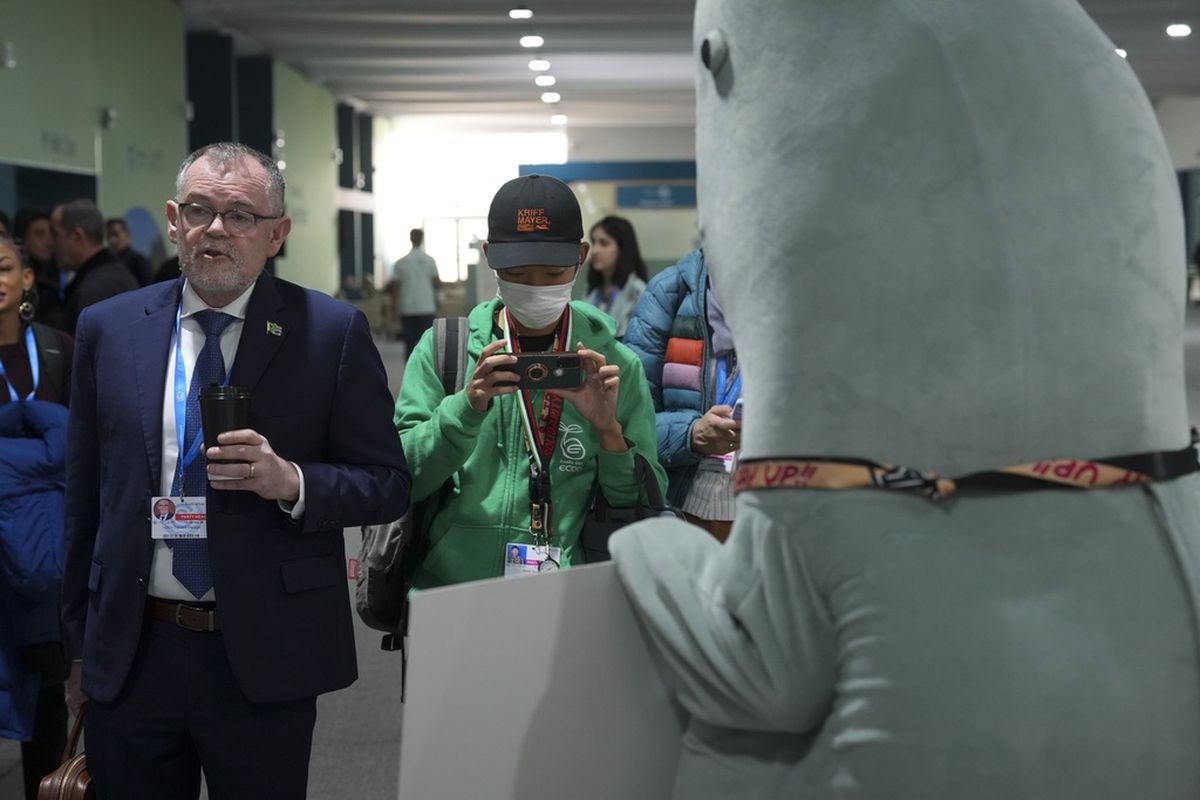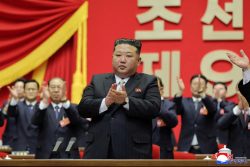Countries at UN Climate Summit under Pressure with No Finance Deal Entering Final Day

Dion George, South Africa environment minister, left, walks past a person in a dugong costume during the COP29 U.N. Climate Summit, Friday, Nov. 22, 2024, in Baku, Azerbaijan.
16:55 JST, November 22, 2024
BAKU, Azerbaijan (AP) — Countries at the United Nations climate summit amped up the pressure on themselves Friday by entering the last scheduled day of talks with no visible progress on their chief goals.
From the start, COP29 has been about climate finance — money that wealthy nations are obligated to pay to developing countries to cover damages resulting from extreme weather and to help those nations adapt to a warming planet. Experts put the figure at $1 trillion or more, but draft texts that emerged Thursday after nearly two weeks of talks angered the developing world by essentially leaving blank the financial commitment.
The talks often run into overtime as wealthier nations are pressed to pay for impacts caused largely by their emissions from centuries of burning fossil fuels. The late finish also adds pressure on Azerbaijan, the oil-rich nation presiding over this year’s COP, or Conference of Parties.
In a statement late Thursday, the presidency struck an optimistic tone, saying the outlines of a financial package “are starting to take shape” and promised new draft texts on Friday.
“COP29 urges all parties to engage urgently and constructively in order to reach the ambitious outcome that we all need,” the statement said.
Frustrated delegates wait to see a new draft deal
As negotiators, observers and civil society organization representatives waited for a new draft text to be released on Friday, many said they were frustrated and disappointed with the talks so far.
“No deal is better than a bad deal,” said Harjeet Singh of the climate advocacy group, Fossil Fuel Non Proliferation Treaty.
Singh said the key bottleneck is rich countries’ reluctance to say how much they are willing to pay for countries to transition away from fossil fuels and toward clean energy, adapt to the drought, storms an extreme heat and pay for losses and damages caused by climate change. Independent experts put the figure needed at $1 trillion per year.
“Things are absolutely stuck,” he said. “It’s negotiation in bad faith by developed countries.”
Bryton Codd, part of Belize’s negotiating team, said there is a lot of frustration felt by participants at the climate talks.
“I’m just waiting to see if that (climate finance goal) will actually be presented,” he said.
“Year after year our people come here and we dance this dance and play this game. No one comes here out of excitement, we come because we have no choice. Because we cannot let this process fail,” said Tongan climate activist Joseph Sikulu with the environmental group 350.org. “Nothing less than $1 trillion in grants per year will be enough to see those most impacted by climate change on a just transition towards a safe, equitable future.”
‘Slap in the face’ for text to have no financial figure
On Thursday, COP29 President Mukhtar Babayev convened a Qurultay — a traditional Azerbaijani meeting — where negotiators spoke to hear all sides. He promised to find “a way forward regarding future iterations” of the deal.
Panama’s Juan Carlos Monterrey Gomez said the “lack of commitment transparency feels like a slap in the face to the most vulnerable.”
“It is just utter disrespect to those countries that are bearing the brunt of this crisis,” he said. “Developed countries must stop playing games with our life and put a serious quantified financial proposal on the table.”
Other areas that are being negotiated include commitments to slash planet-warming fossil fuels and how to adapt to climate change. But they’ve seen little movement.
European nations and the United States criticized the package of proposals for not being strong enough in reiterating last year’s call for a transition away from fossil fuels.
U.S. climate envoy John Podesta said he was surprised that “there is nothing that carries forward the … outcomes that we agreed on last year in Dubai.” The United States, the world’s biggest historic emitter of greenhouse gases, has played little role in the talks as it braces for another presidency under Donald Trump.
Days earlier, the 20 largest economies met in Brazil and didn’t mention the call for transitioning away from fossil fuels. UN Secretary General Antonio Guterres, who was at that meeting, said official language is one thing, but reality is another.
“There will be no way” the world can limit global warming to 1.5 degrees Celsius “if there is not a phase out of fossil fuels,” Guterres said at a Thursday news conference.
Top Articles in News Services
-

Survey Shows False Election Info Perceived as True
-

Prudential Life Expected to Face Inspection over Fraud
-

Hong Kong Ex-Publisher Jimmy Lai’s Sentence Raises International Outcry as China Defends It
-

Japan’s Nikkei Stock Average Touches 58,000 as Yen, Jgbs Rally on Election Fallout (UPDATE 1)
-

Japan’s Nikkei Stock Average Falls as US-Iran Tensions Unsettle Investors (UPDATE 1)
JN ACCESS RANKING
-

Japan PM Takaichi’s Cabinet Resigns en Masse
-

Japan Institute to Use Domestic Commercial Optical Lattice Clock to Set Japan Standard Time
-

Israeli Ambassador to Japan Speaks about Japan’s Role in the Reconstruction of Gaza
-

Man Infected with Measles Reportedly Dined at Restaurant in Tokyo Station
-

Videos Plagiarized, Reposted with False Subtitles Claiming ‘Ryukyu Belongs to China’; Anti-China False Information Also Posted in Japan























